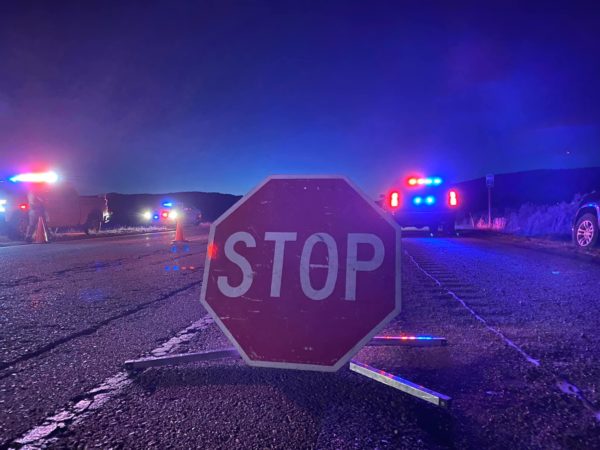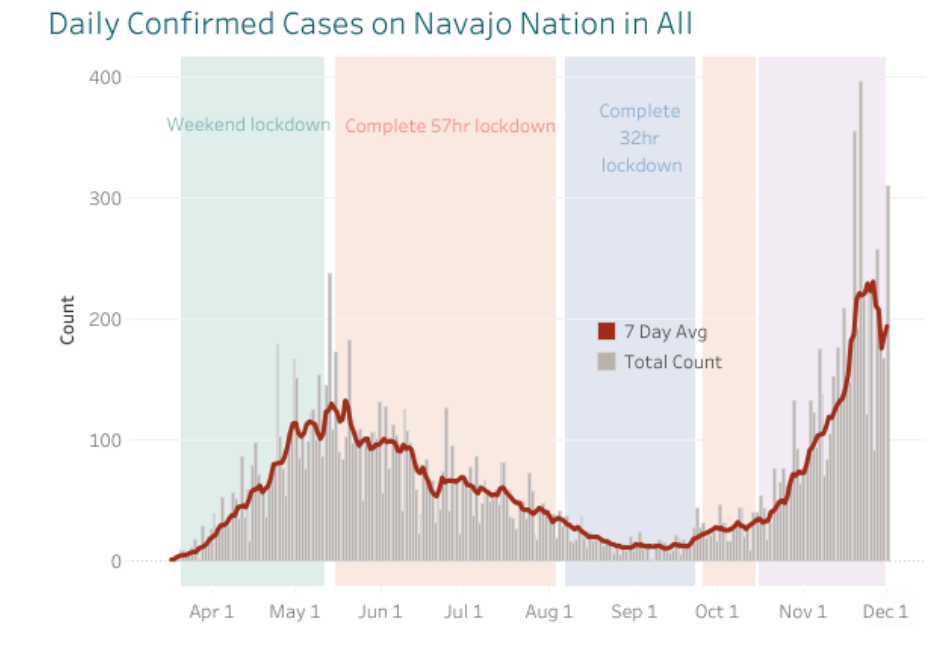
- Details
- By Native News Online Staff
WINDOW ROCK, Ariz. — With the new surge of Covid-19 cases on the Navajo Nation, leaders of the largest Indian reservation on Thursday declared a major health care crisis.
The Navajo Nation has been the epicenter of Covid-19 outbreak in Indian Country since March. By late July, the curve flattened on new cases there. However, in recent weeks, along with most of the United States, the deadly virus has been surging again with more than 100 cases per day than at the worst part of May when the cases were peaking.
“Our health care experts are now saying that the current wave or surge is far more severe and troublesome than the wave that we saw in April and May, perhaps four or five times larger according to projections,” Navajo Nation President Jonathan Nez said in a statement. He added that he has asked the federal government to issue a major disaster declaration that would allow the tribe to unlock crisis funding.
On Thursday, Navajo Nation President Jonathan Nez and Vice President Myron Lizer also signed a letter requesting President Trump and the Federal Emergency Management Agency (FEMA) to issue a Major Disaster Declaration for the Navajo Nation for Individual Assistance Crisis Counseling, Disaster Case Management and Public Assistance Category B (Emergency Protective Measures) including Direct Federal Assistance for all Navajo Nation Chapters, our local units of government, and all other additional federal services and assistance allowed under a Major Disaster Declaration.
Dr. Loretta Christensen, Chief Medical Officer for Navajo Area Indian Health Service, stated that we are “truly in crisis mode” as hospitals continue to receive more and more hospital visits and hospitalizations related to COVID-19. The current situation is leading to a shortage of hospital beds, oxygen supplies, medical personnel, and increasing wait times to transfer severe COVID-19 patients to other hospital facilities in the region that are better equipped to assist.

To combat the further spread of the Covid-19 virus, Navajo Nation officials set in place a public health emergency order that goes into effect on Monday, Dec. 7, 2020 and remains in effect until Monday, Dec. 28, 2020.
The emergency order extends the Stay-At-Home Lockdown which requires all residents to remain at home 24-hours, seven days a week, with the exceptions of essential workers that must report to work, emergency situations, to obtain essential food, medication, and supplies, tend to livestock, outdoor exercising within the immediate vicinity of your home, wood gathering and hauling with a permit.
Additionally, the order re-implements full 57-hour weekend lockdowns for three additional weekends that include: 8:00 P.M. MST through 5:00 A.M. MST on Dec. 11, 2020 through Dec. 14, 2020, and for the same hours on Dec. 18, 2020 through Dec. 21, 2020 and Dec. 25, 2020 through Dec. 28, 2020.
It mandates essential businesses including gas stations, grocery stores, laundromats, restaurants and food establishments that provide drive-thru and curbside services, and hay vendors can operate from 7:00 a.m. (MST) to 7:00 p.m., Monday through Friday only.
The emergency order also directs Navajo Nation citizens to refrain from gathering with individuals from outside your immediate household and require all residents to wear a mask in public, avoid public gatherings, maintain social (physical) distancing, remain in your vehicle for curb-side and drive-through services.
In addition, President Nez and Vice President Lizer issued Executive Order 011-20, to limit services and require Navajo Nation government and enterprises to remain closed through Sunday, Dec. 27, 2020, with the exception of essential employees as determined by division directors and enterprise management, to maintain essential services and functions of the government. This is due to the growing numbers of positive COVID-19 cases on the Navajo Nation.
To view Public Health Emergency Order No. 2020-031, please visit: https://www.ndoh.navajo-nsn.gov/COVID-19.
More Stories Like This
Native News Weekly (August 25, 2024): D.C. BriefsUS Presidents in Their Own Words Concerning American Indians
Flanagan Calls ICE Agents ‘out of control’ after Woman Killed in Minneapolis
American Indigenous Tourism Association Announces New Board Members
Deb Haaland Talks Youth, Jobs and Opportunity in Governor Bid
Help us defend tribal sovereignty.
At Native News Online, our mission is rooted in telling the stories that strengthen sovereignty and uplift Indigenous voices — not just at year’s end, but every single day.
Because of your generosity last year, we were able to keep our reporters on the ground in tribal communities, at national gatherings and in the halls of Congress — covering the issues that matter most to Indian Country: sovereignty, culture, education, health and economic opportunity.
That support sustained us through a tough year in 2025. Now, as we look to the year ahead, we need your help right now to ensure warrior journalism remains strong — reporting that defends tribal sovereignty, amplifies Native truth, and holds power accountable.
 The stakes couldn't be higher. Your support keeps Native voices heard, Native stories told and Native sovereignty defended.
The stakes couldn't be higher. Your support keeps Native voices heard, Native stories told and Native sovereignty defended.
Stand with Warrior Journalism today.
Levi Rickert (Potawatomi), Editor & Publisher

